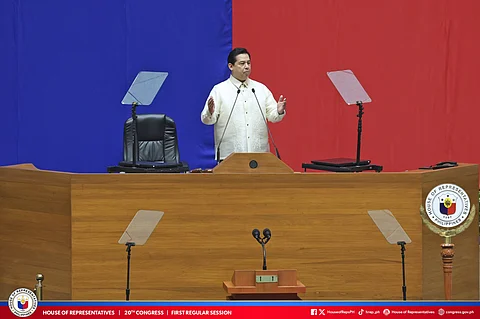
- NEWS
- the EDIT
- COMMENTARY
- BUSINESS
- LIFE
- SHOW
- ACTION
- GLOBAL GOALS
- SNAPS
- DYARYO TIRADA
- MORE

House Speaker Martin Romualdez on Thursday slammed the Senate’s swift decision to archive the impeachment complaint against Vice President Sara Duterte, despite a pending motion for reconsideration before the Supreme Court.
“The Senate — not sitting as an impeachment court — moved swiftly to archive the complaint against Vice President Duterte, even while the case is still pending before the Supreme Court. Why the rush?” Romualdez said.
Nineteen senators voted to archive the articles, citing the Supreme Court’s unanimous decision declaring the complaint unconstitutional for violating the one-year bar on filing multiple impeachment cases against the same official. Only four senators dissented, while one abstained.
Romualdez argued the case remained active due to the unresolved motion. He said the Senate’s move “effectively buried the complaint,” undermining the House’s exclusive constitutional role in initiating impeachments.
“The filing of the complaint was not rushed. What was rushed — remarkably — was its burial. This moment will be remembered,” he warned.
‘Personal attacks’
The Speaker also hit back at unnamed senators who accused the House of politicizing the complaint to derail Duterte’s potential 2028 presidential run.
He was responding to Senate President Francis “Chiz” Escudero’s statement that the Senate “is not a playground to run after your political enemies.”
Senator Imee Marcos, Duterte’s ally and a sister of President Ferdinand Marcos Jr., even suggested that instead of impeaching Duterte the House should replace Romualdez, her cousin, as Speaker.
“To my dear congressmen, why don’t you just change your Speaker?” she said sarcastically.
Romualdez fired back: “This was never about political maneuvering. Yet we have been met with personal attacks, sweeping accusations, and a narrative that seeks to reduce a solemn constitutional duty to a mere power play. That’s not just unfair — it is dangerous.”
His allies in the House defended the Speaker. Senior Deputy Speaker David Suarez called Marcos’ remarks a “blatant overreach,” while Deputy Speaker Paolo Ortega V stressed that Romualdez’s leadership is “a collective institutional decision.”
Rep. Bienvenido Abante Jr. said the impeachment was about “constitutional integrity,” not 2028 politics. “It is about whether public funds were used without a legal mandate.”
The House insisted the fourth impeachment complaint triggered the one-year bar, not the earlier three, which were archived. The Supreme Court disagreed, saying archiving was effectively a dismissal, making the new filings unconstitutional.
In its motion for reconsideration, the House cited “factual errors” and a “misinterpretation” of the one-year bar. It also claimed that Duterte was not denied due process when the House fast-tracked the fourth complaint — signed by 215 members — directly to the Senate.
Romualdez stood by the House’s actions. “We exercised our power lawfully, transparently, and in good faith. Not out of spite, but out of duty; not to attack, but to ask for answers — answers the Vice President never gave.”
Duterte, who has denied all the accusations, claimed her use of P612.5 million in confidential funds was legal and her “assassination plot” remark was taken out of context.
Senators warn
of dangerous precedent
Meanwhile, the Senate’s move has drawn criticism from within the chamber, with some senators warning that the archiving of the impeachment case could stall future efforts to hold high-ranking officials accountable.
Senate Majority Leader Joel Villanueva said the complaint is now “deemed dead” and reviving it this year would be difficult. “I can’t think of anything that was archived and then brought back to the plenary,” he said. “Our move is anchored on the Constitution and fair process.”
Senators Risa Hontiveros and Tito Sotto had pushed to table — not to archive — the complaint until the Supreme Court ruled on the appeal. “If it’s archived, even if it’s not dead, it becomes very difficult to bring out,” Hontiveros said, calling it “a heavy blow to accountability.”
Sotto also questioned the logic of archiving the complaint while claiming no jurisdiction: “I thought we didn’t have jurisdiction?”
Hontiveros criticized the lack of transparency. “How can the public move on if they don’t know the whole story?” she said, noting that even the senators didn’t see the evidence or the witnesses.
“What a waste,” she said. “They really archived it.”
She said, however, that a new complaint could be filed in February 2026.
